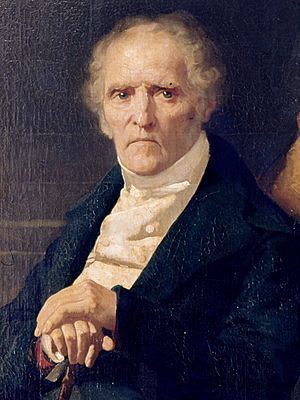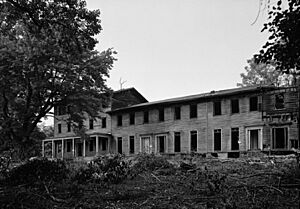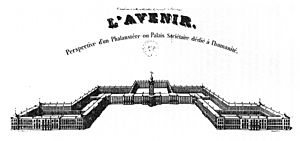Charles Fourier facts for kids
Quick facts for kids
Charles Fourier
|
|
|---|---|

Portrait by Jean Gigoux, 1835 (detail)
|
|
| Born |
François Marie Charles Fourier
7 April 1772 |
| Died | 10 October 1837 (aged 65) |
| Era | 19th-century philosophy |
| Region | Western philosophy |
| School | Utopian socialism Fourierism |
|
Main interests
|
Political philosophy Economics Philosophy of desire |
|
Notable ideas
|
Phalanstère "Attractive work" |
|
Influences
|
|
|
Influenced
|
|
François Marie Charles Fourier (born April 7, 1772 – died October 10, 1837) was a French philosopher. He was an important early socialist thinker. He is known as one of the people who started utopian socialism.
Some of Fourier's ideas about society and morals were very new for his time. But today, many of them are common ways of thinking. For example, Fourier is believed to have created the word feminism in 1837.
Fourier's ideas about society inspired many intentional communities. These were places where people tried to live together based on his plans. Some of these communities were in the United States. Examples include Utopia in Ohio, La Reunion near Dallas, Texas, and Brook Farm in Massachusetts. In France, he influenced the Familistery of Guise in Guise. Fourier later inspired many other thinkers and writers.
Contents
Life of Charles Fourier
Charles Fourier was born in Besançon, France, on April 7, 1772. His father was a small businessman. But Charles was more interested in building things than in his father's work. He wanted to become an engineer. However, the local military engineering school only accepted sons of noble families. Fourier later said he was glad he didn't become an engineer. He felt it would have taken too much time away from his real wish to help people.
When his father passed away in 1781, Fourier received a large part of his father's money. This money allowed him to travel around Europe. In 1791, he moved from Besançon to Lyon. There, he worked for a merchant. Fourier also traveled to Paris, where he worked for a few months at the Office of Statistics.
From 1791 to 1816, Fourier worked in different cities like Paris, Rouen, and Marseille. He was a traveling salesman and a clerk. He felt these jobs took up too much of his time. He complained that his work stopped him from focusing on his true ideas.
He started writing his own books. His first book came out in 1808. But it did not sell well. Six years later, a man named Monsieur Just Muiron found the book. He became Fourier's supporter. Fourier wrote most of his important works between 1816 and 1821. In 1822, he tried to sell his books again, but still without much success.
Charles Fourier died in Paris in 1837.
Fourier's Main Ideas
Fourier believed that if people in society worked together, they would be much more productive. He thought workers should be paid based on how much they contributed. Fourier imagined this cooperation happening in special communities. He called these communities "phalanxes." They would live in large buildings called Phalanstères, or "grand hotels."
These buildings would have four levels of apartments. The richest people would live on the top floors. The poorest would live on the ground floor. A person's wealth depended on their job. Jobs were given based on what each person liked to do. There were also special payments for jobs people might not enjoy as much. This was to make sure all necessary work was done.
Views on Society
Fourier thought that poverty was the main reason for problems in society. He believed that if everyone had good wages and a "decent minimum" income, these problems would disappear. He used the word "civilization" in a negative way. For him, "civilization" meant a dishonest and limiting way of life. He felt it was full of lies and rules that held people back.
Women's Rights
Fourier was a strong supporter of women's rights. This was unusual for his time, when many thinkers like Jean-Jacques Rousseau had different views. Fourier believed that women should be able to do any important job. He thought their skills and abilities, not their gender, should decide their roles. He saw women as complete individuals, not just as part of a couple. Fourier also thought that traditional marriage could sometimes limit women's rights. Because of this, he never married.
He believed that both men and women have many different needs and desires. These desires might change throughout their lives. He argued that being different and expressing oneself could actually help society work better together. Fourier wanted to free every person—men, women, and children. He wanted them to have good education and to be able to follow their true passions.
Children and Education
Fourier had unique ideas about education. He felt that many grown-ups saw children as lazy. Fourier thought this was wrong. He believed that even very young children, like two or three-year-olds, were naturally hardworking. He listed some common interests in all children:
- They like to explore everything, touch everything, and constantly change what they are doing.
- They enjoy noisy activities and being busy.
- They like to copy what others do.
- They enjoy small workshops and miniature tasks.
- They are naturally drawn to stronger or more experienced people.
Fourier was very worried about the disorder he saw around him. He wanted to bring stability and harmony to the world. He is best known for his ideas about a new world order. This new world would be based on everyone working together in harmony. He also had some very imaginative ideas, like the seas turning into lemonade and the North Pole becoming warmer than the Mediterranean in a perfect future.
Fourier's Influence
Fourier's ideas had a big impact on French politics. His followers, like Victor Considerant, helped carry his ideas into the 1848 Revolution and the Paris Commune.
- Many of Fourier's ideas appear in Dostoevsky's novel Demons, published in 1872.
- Fourier's ideas also became popular in America. His followers started communities called phalanxes across the country. One of the most famous was Utopia, Ohio.
- Peter Kropotkin, a famous thinker, saw Fourier as the founder of the libertarian side of socialist thought. This was different from other socialist ideas that focused more on strict control.
- In the mid-1900s, Fourier's influence grew again. Writers who were looking for socialist ideas outside of Marxist thought rediscovered him. After the Surrealists group broke away from the French Communist Party, André Breton returned to Fourier's ideas. He wrote a poem called Ode à Charles Fourier in 1947.
- Walter Benjamin, an important writer, thought Fourier was very important. He wrote that Fourier "made play the rule for work that no longer involved being used unfairly." He noted that Fourier's ideas could only be imagined in the hopeful time of the mid-1800s.
- Herbert Marcuse, in his book Eros and Civilization, praised Fourier. He said that Fourier helped explain how freedom depends on expressing desires in a healthy way.
- In 1969, Raoul Vaneigem used and changed Fourier's writings in his own text about self-management.

- Fourier's work has also influenced writers like Gustav Wyneken, Guy Davenport, Peter Lamborn Wilson, and Paul Goodman.
- In the movie Metropolitan, a character named Tom Townsend says he is a Fourierist. He discusses the success of the social experiment Brook Farm with another character.
- David Harvey, a geographer, used Fourier's ideas in his own vision for the future of cities.
- Murray Bookchin, a Libertarian socialist and environmental thinker, wrote about Fourier. He said that Fourier's idea of people doing many different tasks in a shorter work week was important. This idea helped break down differences between manual and intellectual work. It also made people's experiences richer.
- Nathaniel Hawthorne gently made fun of Fourier in his novel The Blithedale Romance. He mentioned Fourier's idea that the ocean would turn into lemonade.
- Writers who support post-left anarchy have praised Fourier's writings. Bob Black, in his work The Abolition of Work, suggests Fourier's idea of "attractive work" as a solution to problems with modern work. Hakim Bey said that Fourier "lived at the same time as De Sade & (William) Blake, & deserves to be remembered as their equal or even superior."
Fourier's Works
- Fourier, Charles. Théorie des quatre mouvements et des destinées générales. (Theory of the four movements and the general destinies), published in Lyon in 1808.
- Fourier, Charles. Le Nouveau Monde amoureux. Written 1816–18, published widely in 1967.
- Fourier, Ch. Œuvres complètes de Ch. Fourier. 6 volumes. Paris: Librairie Sociétaire, 1841-1848.
- Fourier, Charles. La Fausse Industrie Morcelée, Répugnante, Mensongère, et L'Antidote, L'Industrie Naturelle, Combinée, Attrayante, Vérdique, donnant quadruple produit (False Industry, Fragmented, Repugnant, Lying and the Antidote, Natural Industry, Combined, Attractive, True, giving four times the product, Paris: Bossange. 1835.
- Fourier, Charles. Oeuvres complètes de Charles Fourier. 12 volumes. Paris: Anthropos, 1966–1968.
- Jones, Gareth Stedman, and Ian Patterson, eds. Fourier: The Theory of the Four Movements. Cambridge Texts in the History of Political Thought. Cambridge: Cambridge UP, 1996.
- Fourier, Charles. Design for Utopia: Selected Writings. Studies in the Libertarian and Utopian Tradition. New York: Schocken, 1971. ISBN: 0-8052-0303-6
- Poster, Mark, ed. Harmonian Man: Selected Writings of Charles Fourier. Garden City: Doubleday. 1971.
- Beecher, Jonathan and Richard Bienvenu, eds. The Utopian Vision of Charles Fourier: Selected Texts on Work, Love, and Passionate Attraction. Boston: Beacon Press, 1971.
- Wilson, Peter Lamborn, Escape from the Nineteenth Century and Other Essays. Brooklyn: Autonomedia, 1998.
See also
 In Spanish: Charles Fourier para niños
In Spanish: Charles Fourier para niños
 | Ernest Everett Just |
 | Mary Jackson |
 | Emmett Chappelle |
 | Marie Maynard Daly |


